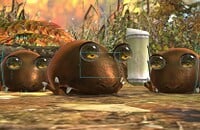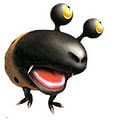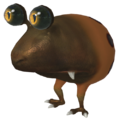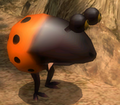Orange Bulborb
The Orange Bulborb (テンテンチャッピー?, lit.: "Restless Chappy") is an enemy in Pikmin 2, Pikmin 3, and Pikmin 4. It has a general Bulborb appearance, but has brown skin, yellow bloodshot eyes, and its backside is orange with brown spots. It has the same strategy that all Bulborbs use for attacking, however, this is a unique Bulborb sub-species in that it wakes up if prey are within close range (about the range of the cursor's reach in the GameCube games), and has slightly more health, making it difficult to defeat with the traditional Bulborb-defeating tactics. It is otherwise the same as the other Bulborbs. They may be found in many places, such as the Bulblax Kingdom, or on land in the Wistful Wild, by the Dream Den. Usually when there is one of these around, it is almost sure that there may be many Dwarf Orange Bulborbs around.
In Pikmin 3, the creature is much more rare, appearing only 4 times throughout the main story. Here, they have physical differences such as their head and face being more brownish. Their pupils have gained a more triangular shape as well. In some Mission Mode stages, they can be found near Clovers, but regardless, they will still be able to see prey hiding under any plant.
Stats
| Game | Weight | Max. carriers |
Seeds | Value | Health | Regen. |
|---|---|---|---|---|---|---|
| 10 | 20 | 12 | 850 | 2.55 HP/s | ||
| 10 | 20 (normally) | 15 | 1800 | No | ||
| 10 | 20 | 12 | 1800 | No |
Behavior
Orange Bulborbs are, like the Bulborb, nocturnal creatures and sleep in mainly underground areas, but can still be found above ground. In the main series of games, this exposes them to being swarmed by Pikmin. However, due to their high-strung nature, they will wake up more often as they can sense both Pikmin and Leaders if too close. They will also chase the Pikmin or Leader for a longer distance compared to a regular Bulborb.
Once awoken, the Orange Bulborb becomes very aggressive and will rush towards any nearby Pikmin or Leader to try and eat them. If it manages to reach any Pikmin, it will stand up to eat them - otherwise it will attempt to attack again after tripping. If there are multiple Pikmin attacking the creature all at once, it will shake itself to throw Pikmin off of itself and try to eat more Pikmin. If the Grub-Dogs eyestalks are attacked, it will panic and stop doing whatever they were doing to shake off the attackers.
If there are no more Pikmin or Leaders near the Orange Bulborb, it will look around and then fall back asleep.
Locations
|
The following article or section is in need of assistance from someone who plays Pikmin 4. |
Biology
Orange Bulborbs are quite similar in design to the regular Bulborb, which is a creature with one of the most diverse physiology in the Pikmin series. They possess traits similar to those of amphibians, reptiles, and mammals. Orange Bulborbs have large bulbous eyes set in stalks, as opposed to the compound eyes of most insects. The eyes of the creature are described by Olimar as being yellow in color as well as being bloodshot, giving it it’s more high-strung nature
Olimar mentions Bulborbs having a set of mandibles, which can also be seen in the Orange Bulborb. Mandibles are a pair of appendages near an insect's mouth, used for grinding and chewing food. The so-called mandibles Olimar mentions in his notes look nothing like normal mandibles and are instead most likely saber-teeth, used for breaking exoskeletons of prey insects and digging through the soil for roots.
The Orange Bulborbs' relationship with Grub-Dog young is complicated. They have been spotted sleeping next to Dwarf Orange Bulborbs (Breadbug mimics), which could be due to the Orange Bulborb thinking that the Dwarf Orange Bulborbs are perhaps Orange Bulborb larvae. There is no evidence of true juvenile Orange Bulborbs in the Pikmin franchise, the only true juvenile Grub-Dogs seen are Dwarf Bulbears and Dwarf Frosty Bulborbs. There are Bulborb Larva birthed by the Empress Bulblax and Albino Dwarf Bulborbs which is the 1st molt of the Bulborb Larva however it is unknown whether they can grow into Orange Bulborbs.
According to Olimar, when certain environmental changes occur, a female Bulborb can transform into an Empress Bulblax, taking on the role of a pack matriarch and giving birth to large amounts of larva. The Empress Bulblax has a similar appearance to the Bulborb as they both have a red body with white spots. This could mean that it’s possible for an orange variant of the Empress Bulblax to exist and that similar behavior could occur.
We also see that Bulbmin are Pikmin which infect other organisms to take control of them. The only host seen up to Pikmin 4 is that of a Bulborb, however, Olimar implied in his notes that it’s possible for other creatures to be hosts so its possible that a Orange Bulbmin variant exists.
Notes
Olimar's notes
Louie's notes
Alph's comments
“Structural flaw: eyeballs, back
Weight: 10
“Structural flaw: eyeballs, back
Weight: 10
Brittany's comments
Charlie's comments
Louie's comments
Olimar's comments
“Orange Bulborb
Oculus kageyamii orangium
Grub-dog family
“Orange Bulborb
Oculus kageyamii orangium
Grub-dog family
Pikmin 2 Nintendo Player's Guide
Pikmin 3 Prima Guide
Dalmo's Notes
Olimar's Notes (Pikmin 4)
“This Bulborb species boasts a garnish color pattern with a deep-orange body and black spots. The orange Bulborb’s yellow, bloodshot eyes make it clear that this Bulborb is excessively edgy and high-strung, making it much easier to wake from deep sleep than other species in the Grub-Dog family.”
Strategy
If a large group of Purple Pikmin is available, simply rain them down on the Orange Bulborb. Even with the Bulborb's head start, the purples will have a good chance of stunning it with serious damage, and hopefully defeating it without losses.
Orange Bulborbs are tricky without purples. It's never wise to attack a large grub-dog from the front since they'll almost surely bite back, and since the Orange Bulborb will wake up before it can be attacked clearly, it will be highly troublesome. If it is approached from the back, quickly run and rain Pikmin on it. It can then be defeated like any other Bulborb. If there is no choice but to approach it from the front, dismiss the Pikmin and use a leader to wake it up. Let the Bulborb chase them until it runs out of its range. When it goes back to sleep, attack it in the back. Orange Bulborbs also have a slight delay in between its "yawning" sequence and waking up again, so use this opportunity to pummel it with Pikmin.
In Pikmin 3, the Orange Bulborb retains all of its traits from Pikmin 2, but due to the lack of Purple Pikmin in Story Mode and the fact that the hiding strategy with Clovers does not work, it can be much tougher to defeat. However, there are other strategies players can use now to take it down. Firstly, the front of the Bulborb is much more vulnerable due to the eyeballs of the Orange Bulborb being a weak point. If one is hit, it will cause the Bulborb to recoil (and spit out any Pikmin that it has eaten). Secondly, all Pikmin can hold bomb rocks, allowing them to be used to defeat the Orange Bulborb quicker. Finally, instead of using Purple Pikmin, Rock Pikmin can be used instead to pummel the Bulborb.
The only Orange Bulborb that is required to take down is the one in the Tropical Wilds; the group of 3 near the Portable Sunset in the Twilight River can be left alone by lifting the nearby bamboo gate. The one in the Tropical Wilds is facing away from the gate, so Bomb Rocks are recommended. Alternatively, the Bulborb can be awoken, and if the player runs away fast enough, it will go back to sleep facing the wall, allowing for an easier attack.
Technical information
| Pikmin 2 technical information (?) | |||
|---|---|---|---|
| Internal name | bluechappy
| ||
| Global properties (List) | |||
| ID | Japanese comment | Property | Value |
| s000 | friction(not used) | Friction | 0.5 |
| s001 | wallReflection | Unknown (wall bounce speed multiplier?) | 0.5 |
| s002 | faceDirAdjust | Unknown | 0.25 |
| s003 | accel | Acceleration | 0.1 |
| s004 | bounceFactor | Unknown (bounce when it hits the ground?) | 0.3 |
| fp00 | ライフ | HP | 850 |
| fp01 | マップとの当り | Unknown (related to slopes) | 40 |
| fp02 | ダメージスケールXZ | Horizontal damage scale | 0.3 |
| fp03 | ダメージスケールY | Vertical damage scale | 0.3 |
| fp04 | ダメージフレーム | Damage scale duration | 0.35 |
| fp05 | 質量 | Unknown (weight?) | 0.1 |
| fp06 | 速度 | Move speed | 115 |
| fp08 | 回転速度率 | Rotation acceleration | 0.4 |
| fp09 | テリトリー | Territory radius | 400 |
| fp10 | ホーム範囲 | "Home" radius | 15 |
| fp11 | プライベート距離 | "Private" radius | 70 |
| fp12 | 視界距離 | Sight radius | 500 |
| fp13 | 視界角度 | FOV | 90 |
| fp14 | 探索距離 | Unknown (exploration radius?) | 500 |
| fp15 | 探索角度 | Unknown (exploration angle?) | 90 |
| fp16 | 振り払い率 | Successful shake rate | 1 |
| fp17 | 振り払い力 | Shake knockback | 120 |
| fp18 | 振り払いダメージ | Shake damage | 1 |
| fp19 | 振り払い範囲 | Shake range | 40 |
| fp20 | 攻撃可能範囲 | Unknown (shock attack max range?) | 75 |
| fp21 | 攻撃可能角度 | Unknown (shock attack max angle?) | 25 |
| fp22 | 攻撃ヒット範囲 | Unknown (attack hit range?) | 80 |
| fp23 | 攻撃ヒット角度 | Unknown (attack hit angle?) | 35 |
| fp24 | 攻撃力 | Attack damage | 10 |
| fp25 | 視界高 | Unknown (height visibility?) | 50 |
| fp26 | 探索高 | Unknown (exploration height?) | 50 |
| fp27 | ライフの高さ | HP wheel height | 90 |
| fp28 | 回転最大速度 | Rotation speed | 4 |
| fp29 | 警戒時間 | Unknown (warning time?) | 3 |
| fp30 | 警戒ライフ | Unknown | 30 |
| fp31 | ライフ回復率 | Regeneration rate | 0.0001 |
| fp32 | LOD半径 | Off-camera radius | 40 |
| fp33 | マップとのあたりポリゴンの選定 | Collision processing radius | 50 |
| fp34 | ピクミンとのあたり | Pikmin damage radius | 30 |
| fp35 | 石化時間 | Petrification duration | 1 |
| fp36 | ヒップドロップダメージ | Purple Pikmin drop damage | 50 |
| fp37 | 地震気絶確立 | Purple Pikmin stun chance | 0.3 (30%) |
| fp38 | 地震気絶時間 | Purple Pikmin stun time | 5 |
| ip01 | 振り払い打撃A | Shake mode 1 – hit count | 6 |
| ip02 | 振り払い張付1 | Shake mode 1 – Pikmin requirement | 5 |
| ip03 | 振り払い打撃B | Shake mode 2 – hit count | 12 |
| ip04 | 振り払い張付2 | Shake mode 2 – Pikmin requirement | 10 |
| ip05 | 振り払い打撃C | Shake mode 3 – hit count | 17 |
| ip06 | 振り払い張付3 | Shake mode 3 – Pikmin requirement | 20 |
| ip07 | 振り払い打撃D | Shake mode 4 – hit count | 22 |
| Specific properties | |||
| ID | Japanese comment | Property | Value |
| fp01 | 足元範囲 | Determines rotation speed while standing (lower values give faster rotations) | 30 |
| fp02 | 白ピクミン毒 | White Pikmin poison damage | 425 |
| fp03 | 目覚め距離 | Wake up distance | 130 |
| Pikmin 3 technical information (?) | |
|---|---|
| Internal name | chappy (tenten)
|
| HP | 1800 |
| Rock Pikmin throw hits to kill | 40 |
| White Pikmin ingestions to kill | 5 |
| Bomb rock explosions to kill | 1 |
| Bomb rock ingestions to kill | 1 |
| Number of direct hits on top to kill | 0 |
| Damage to leaders | 20 |
| Territory radius | 400 |
| Mission Mode value | 50 |
Other information
- Size: Body length: 90mm, as per the e-card
- Pikmin 2 Piklopedia number: #3
Naming
- See more: Grub-dog family#Naming.
- Common name: Orange Bulborbs. They are distinguished from the remaining Bulborbs by being orange, hence their name.
- Japanese nickname: テンテンチャッピー?. テンテン? has the dual meaning of 輾転? (lit.: "tossing and turning (in bed)") and 点々? (lit.: "many dots"). チャッピー? (lit.: "Chappy") is Japanese for "Bulborb".
- Japanese name: ダイダイデメマダラ?, lit.: "Spotted Orange Bug-eye".
- Scientific name: Oculus kageyamii orangium. Oculus kageyammi is the species name for the Bulborbs, and orangium is similar to the English word "orange".
- Internal names: Internally, they are called
bluechappyin Pikmin 2, due to the fact that during development, yellow and blue Bulborbs were planned to exist, but over time, the blue Bulborb got changed into the Orange Bulborb. In Pikmin 3, this enemy is internally recognized as being the same as the Bulborb, so its internal name ischappy, but when it needs to be distinguished, it is calledtenten, over its Japanese name. In Pikmin 4, it is changed toTENTENCHAPPY, which matches its Japanese common name. - Prerelease: None.
Names in other languages
| Language | Name | Meaning | Notes |
|---|---|---|---|
| テンテンチャッピー? Tenten Chappī |
Restless Chappy | "Chappy" is the Japanese name for Bulborb | |
(traditional) |
點點恰比 Diǎndiǎn Qiàbǐ |
Tiny-Speckled Chappy | |
(simplified) |
点点恰比 Diǎndiǎn Qiàbǐ |
Tiny-Speckled Chappy | |
| Oranje bulborb | Orange bulborb | ||
| Bulborbe Orange Bulborbe orange (Pikmin 4) |
Orange Bulborb Orange bulborb (Pikmin 4) |
||
| Orangefarbener Punktkäfer (Pikmin 2) Oranger Punktkäfer (Pikmin 3, Pikmin 4) |
Orange-Colored Bulborb (Pikmin 2) Orange Bulborb (Pikmin 3, Pikmin 4) |
"Punktkäfer" is the German name for Bulborb | |
| Coleto Arancione Coleto arancione (Pikmin 4) |
Orange Bulborb Orange bulborb (Pikmin 4) |
"Coleto" may come from "boletus" (Latin for mushroom), as a bulborb's spots resemble those found on certain mushrooms "Coleto" is the Italian name for both Bulborb and Bulbear | |
| 무당차피 Mudang-Chapi |
Ladybug Chappy | 「무당」is short for「무당벌레」(ladybug) | |
| Bulbolho laranja | Orange bulbeye | "Bulbolho" is a portmanteau of "bulbo" (bulb) and "olho" (eye) "Bulbolho" is the Brazilian Portuguese name for Bulborb | |
| Bulbo naranja | Orange bulborb |
Gallery
An Orange Bulborb exploding after eating a bomb rock. Notice how it turns blue.
The creature's e-card, #03 (2nd blue card).
Trivia
- In Pikmin 2, although an Orange Bulborb will wake up from having a leader or Pikmin pass by close, it will not wake up if a Spotty Bulbear bumps against it, as is the case with other grub-dogs. This can be seen in sublevel 9 of the Hole of Heroes.
- Despite never appearing in any night expeditions in Pikmin 4, Orange Bulborbs can be viewed at night in the Piklopedia. They also deal a unique amount of damage to the Tricknoll, destroying it in only 7 hits.
- This scenario is especially unique, because the Orange Bulborbs in question are always awake. They are always asleep in all of the Caves they appear in, so the Piklopedia entry is the only place to see a permanently awake Orange Bulborb.
See also
| Pikmin 2 enemies |
|---|
| Pikmin 3 enemies |
|---|
| Pikmin 4 enemies |
|---|









